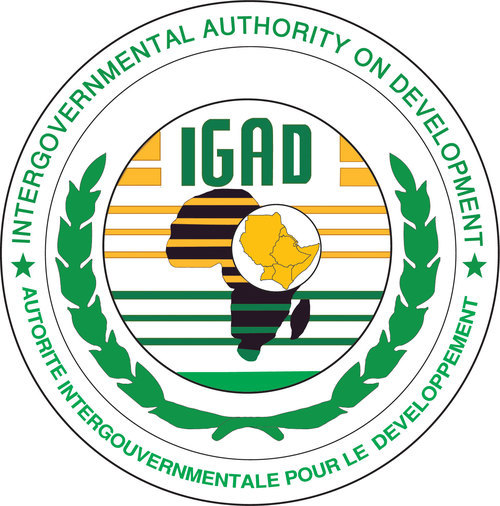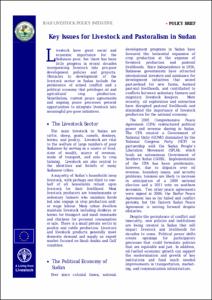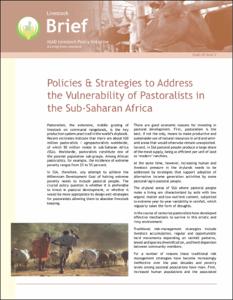Location
P.O. Box 2653
IGAD: its history and development
The Intergovernmental Authority on Development (IGAD) in Eastern Africa was created in 1996 to supersede the Intergovernmental Authority on Drought and Development (IGADD) which was founded in 1986 to mitigate the effects of the recurring severe droughts and other natural disasters that resulted in widespread famine, ecological degradation and economic hardship in the region. Djibouti, Ethiopia, Kenya, Somalia, Sudan and Uganda - took action through the United Nations to establish the intergovernmental body for development and drought control in their region. Eritrea became the seventh member after attaining independence in 1993 and in 2011 South Sudan joined IGAD as the eighth member state.
With the new emerging political and socio-economic challenges, the assembly of Heads of State and Government, meeting in Addis Ababa in April 1995, resolved to revitalize IGADD and expand areas of cooperation among Member States. The new and revitalized IGAD was launched during the 5th Summit of IGAD Assembly of Heads of State and Government held on 25-26 November 1996 in Djibouti. The Summit endorsed the decision to enhance regional cooperation in three priority areas of food security and environmental protection, economic cooperation, regional integration and social development peace and security.
IGAD Vision and Mission Statements
The founding leaders of IGAD were motivated by a vision where the people of the region would develop a regional identity, live in peace and enjoy a safe environment alleviating poverty through appropriate and effective sustainable development programmes. The IGAD Secretariat as the executive body of the Authority was given the mandate to achieve this goal.
Vision: IGAD to be the premier Regional Economic Community (REC) for achieving peace and sustainable development in the region.
Mission: Promote regional cooperation and integration to add value to Member States’ efforts in achieving peace, security and prosperity.
Members:
Resources
Displaying 21 - 25 of 31Key issues for livestock and pastoralism in Sudan
Policies & strategies to address the vulnerability of pastoralists in the sub-Saharan Africa
Sudan Progress Reports; 'IDDRSI' IGAD Drought Disaster Resilience and Sustainability Initiative
Oxfam Novib SeedsGROW 2, 2019-2024 - Oxfam Novib SeedsGROW 2, 2019-2024 env
General
Reprogrammed funds to mitigate the impact of COVID-19 Oxfam Novib has applied to Sida for funding of SEK 190 millions towards the SeedsGROW 2 program for the 2019-2024 period. SeedsGROW 2 is an extension and continuation of the current SeedsGROW 1 program to which Sida contributes with a total of SEK 171 millions during the 2013-2018 period. There are some lessons learned from Phase 1, as Oxfam prepares for phase 2. These are; the importance of the Farmer Field Schools and how these can evolve, and how the campaign around the food value chain has increased understanding among consumers, businesses and governments. SeedsGROW 2 will consist of two components "Sowing Diversity = Harvest Security (SEK128 millions) and GROW (SEK 62 millions). SD = HS will be implemented in seven countries (Guatemala, Peru, Nepal, Laos, Uganda, Zimbabwe and Zambia), and in China as a learning partner. GROW will be implemented in four countries (Brazil, Pakistan, Thailand and Uganda). Brazil, Pakistan and Thailand are exporters of various global goods and are important to many companies targeted by the GROW campaign, where the goal is to highlight the major inequalities affecting poor food producers. The overall objective of SeedsGROW 2 is to contribute to a global food system that is just and sustainable, that supports the rights of small-scale food producers- men and women-, that guarantees food and nutrition security and that promotes the sustainable management of natural resources and biodiversity within the context of a changing climate. The target groups for both SD = HS and GROW are indigenous peoples and small farmers - women, men and youths. The objective of the program is that indigenous people enjoy their rights and have the capacity to access, develop and use plant genetic resources to improve their food security, including food nutritional value, despite climate change.The four pillars of the program, including four outcomes in the theory of change, are expected to be mutually reinforcing and contribute to the overall objective.Outcome 1, Strengthening of Plant Diversity, aims to make indigenous peoples and small-scale communities more resistant through access to, use and management of plant genetic resources, both in terms of food safety, nutrition, disaster management and adaptation to climate change.Outcome 2, Markets - aims to strengthen security of supply and secure access to seeds through the creation and availability of markets for high quality seeds adapted to farmers' needs.Outcome 3 is called Neglected and Underutilized Species (NUS) - the expected result is to strengthen the resilience of local communities by increasing the nutritional value of food through the promotion of NUS, thereby strengthening biodiversity, which is also beneficial to health and community resilience.Outcome 4, Policy and Institutions aims to provide stakeholders support for the possible political and institutional framework for banding seed systems and implementation of farmer’s rights.b). GROW is an impact project aimed at changing the current food production system by encouraging and supporting public and private actors to revise policies and practices. Key areas to be addressed are land rights, climate change and inequalities in the food value chain. This is expected to benefit women small-scale food producers and their communities.The two components are separate from each other, but Sida will in dialogue with Oxfam Novib, encourage search for synergies based on expected results.The vision for Grow II is the same as for SD = HS. Their Theory of Change (ToC) is problem-focused, focusing on female food producers and their local communities, which are increasingly affected by climate change, and have insecure land rights and incomes, as well as small opportunities for impact. The long-term goal of the initiative is to create a global movement for food justice with the goal of promoting private and public policies.
Objectives
The overall objective of the phase 2 programme is to contribute to a global food system that is just and sustainable, that supports the rights of small-scale food producers- men and women-, that guarantees food and nutrition security and that promotes the sustainable management of natural resources and biodiversity within the context of a changing climate. By the end of the project, women small-scale food producers will benefit from policy and practice change that empowers them to address injustices in the food value chains, increases their resilience to climate impacts and contribute to secure and equitable land rights.. Medium to long term changes envisioned by SD=HS and which form the core of the Theory of Change are: Pillar 1: through self sustaining Farmer Field Schools and over 35,000 grassroots master trainers, resilient indigenous and farming communities are better able to access and sustainably use plant genetic resources for food and nutrition security, climate change adaptation and disaster management. Pillar 2: by contributing towards a farmer inclusive market, indigenous peoples and small-holder farmers enhance their livelihoods, income and seed security through improved production of and improved policies on market access to high-quality seeds of diverse crops and varieties. Pillar 3: by understanding and addressing the hunger period, rural communities have strengthened their coping strategies by increasing the intake of nutritious food based on local biodiversity and improved management of neglected and underutilized species (NUS). Pillar 4: by providing evidence in support of farmers seed systems, Policy makers, seed industry and other stakeholders support an enabling policy and institutional environment for farmers seed systems and the implementation of Farmers Rights. Participatory Knowledge Management: though larger scale documentation, farmers access and use of information, and targeted communication materials, SD=HS will further enable reach out and facilitate exchange of knowledge and seed and foster greater cooperation of multiple stakeholders engaged in plant genetic resources for food and agriculture. By the end of the project at least 215,000 households in indigenous and farming communities will have benefitted. The target is that at least 50% of these beneficiaries will be women. The overall objective of the GROW project component is to contribute to a diverse and active movement for food justice across the world and to ensure women small-scale food producers and their communities benefit more from local, national and global public and private sector policies that ensure their food security and that protect and promote their prosperity and resilience. Long term changes envisioned by GROW are; globally and nationally operating food companies share power and wealth more equally in their supply chains, contributing to a poverty-free food system. Oxfam will encourage key private sector actors in the agri-food systems to improve their policies and practices in the areas of land rights, climate change and food value chains; public and private financial sector actors prioritize projects that support women small-scale food producers and their communities, that respect land rights and that are aligned with the goals of the Paris Agreement. Oxfam will engage with International Financial Institutions and other globally relevant Financial Institutions to ensure better alignment with international benchmarks, and leverage progress in their lending standards to encourage governments and others to do so; governments address the needs of women small-scale food producers and their communities, particularly those affected by climate change, through pro-poor climate adaptation plans, finance for irreversible loss and damage as result of climate change, and secure and equitable land rights. Sida assesses that the planned objectives of the intervention are plausible. There is simply a clear logic between the objectives.





